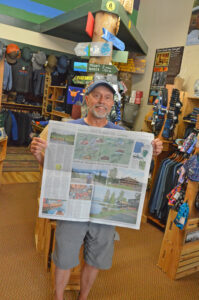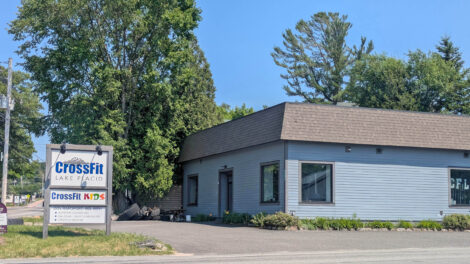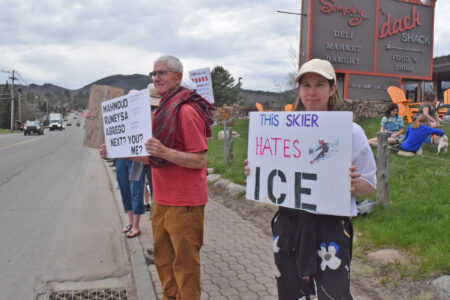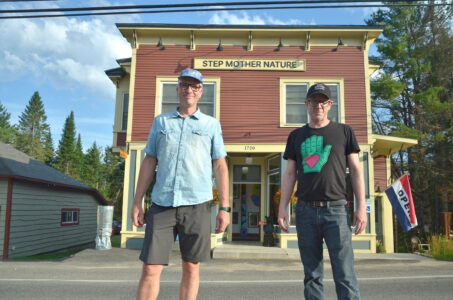Businesses seek clarity on reopening, need workers
The operators of large attractions want more clarity about when they will be allowed to reopen, saying they’ve been left in the dark.
“We’ve invested hundreds of thousands of dollars to operate safely in our environment, and we have no idea when that’s going to happen,” said Six Flags Great Escape President Rebecca Wood during a conference call on Friday.
U.S. Rep. Elise Stefanik, R-Schuylerville, hosted the call to hear from elected officials and businesses about how they are grappling with the pandemic. Unclear guidance from the state was among the issues mentioned, along with the difficulty of finding workers and, for municipalities, the loss of tax revenue.
Wood said Great Escape has bought thermal temperature scanners and touchless entry systems to get into the park. Her staff is also working to improve food service delivery.
Now, they want answers for the 200 full-time employees and their families about when the park will open.
“We understand that answers were given to other industries — good or bad — and that’s just what we need,” Wood said.
“Everybody’s hands are tied if we can’t communicate better and help businesses see where they stand,” she said.
Another issue is the suspension of J-1 visas. International students are not coming this year because of the COVID-19 pandemic, Wood said. Once the business gets a green light, it will be difficult to hire enough staff, she said.
Rebecca Breese, a co-manager for the Washington County Fair, said she also would like to get more guidance from the state about what types of events would be allowed. Although the fair is canceled, she said previously the fairgrounds might host an antiques show in August and a Wool and Arts Festival in September.
“We have an open air property that has a lot of space for social distancing,” she said.
The fairgrounds has hand-sanitizing and washing stations spread throughout the property.
Breese said state officials have said venues must be restricted to 33% capacity, but she is not getting information about how that should be calculated. Having a few events would at least help the fairgrounds make it to next year.
Stefanik said she would keep pushing for certainty and clarity on these issues.
The labor shortage was mentioned by others on the call. There are 500 open positions in the Lake George area, according to Gina Mintzer, president of the Lake George Chamber of Commerce.
A list of open positions can be seen at www.lakegeorgeishiring.com.
The biggest obstacle to hiring is people staying home because they are collecting unemployment insurance, she said.
More visitors are coming to the area, as the business community and county have worked to help ensure their safety, Mintzer said.
“We are seeing some positives for July. We can’t make up June. We’re seeing some great forward movement for visitation for July and August,” she said.
Legislation sponsored by Democrats in the House of Representatives would extend the $600 weekly unemployment insurance through the end of the year. That would be very harmful to the economy, according to Adirondack Regional Chamber of Commerce President Michael Bittel.
“We really cannot afford as a business community to have that extended as it stands. We’ve got to get America back to work,” he said.
Lack of child care is also an obstacle to economic recovery. Bittel said state mandates for a child care business to expand or start up are “insurmountable” in many cases.
Businesses and government entities need liability coverage to protect against coronavirus-related lawsuits, Bittel said.
“There are cases across the country where people are having frivolous lawsuits claiming they received COVID at a business or at a school,” he said.
Assemblyman Dan Stec, R-Queensbury, said he is hearing from people whose businesses are still shuttered.
“They’re very frustrated. They’re concerned about their viability,” he said.
The business slowdown will cause a substantial reduction in tax revenue, he said.
Stefanik said she is one of the lead negotiators for the State and Municipal Assistance for Recovery and Transition Act, which provide $500 billion in direct aid to state and local municipalities.
She is also working to make chamber and business advocacy organizations eligible for the Paycheck Protection Program. Chambers of commerce have taken a hit because they rely on dues from their members, she said.
She mentioned the possibility of another round of Payroll Protection Program funding, targeted to sectors of the economy that are particularly stressed, such as hospitality.
Another issue raised by members in the northern portion of Stefanik’s district is the closed border with Canada and the loss of those visitors.
Garry Douglas, president of the North Country Chamber of Commerce, said it is a tough battle, as Canada has reason to be concerned given the rise in COVID-19 cases in other parts of the country.
“We’re not saying reopen the border tomorrow. That’s not going to happen. We need to have a decision-making metric,” he said.
Fort Ticonderoga President and CEO Beth Hill said the museum is seeing visitors, but revenues are down because they can only operate at half capacity and the cost of doing business has increased.
Sen. Betty Little, R-Queensbury, said she is becoming more pessimistic as the coronavirus pandemic lingers. Businesses thought it was going to be a short-term shutdown. Even businesses that are open, such as hair salons, are limited in the number of customers they can see.
“One business after the other is having difficulty, going out,” she said.
One bright spot is an increase in recreational activities, according to Little. Golfing is booming, and a lot of people are boating and engaging in other outdoor recreational activities.




